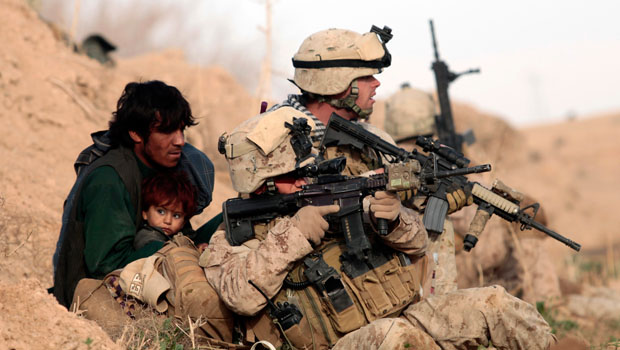NATO said it hoped to secure the area in days, set up a local government and rush in development aid in a first test of the new US strategy for turning the tide of the eight-year war. The offensive is the largest since the 2001 US-led invasion of Afghanistan.
The Taleban appeared to have scattered in the face of overwhelming force, possibly waiting to regroup and stage attacks later to foil the alliance's plan to stabilize the area and expand Afghan government control in the volatile south.
NATO said two of its soldiers were killed in the first day of the operation — one American and one Briton, according to military officials in their countries. Afghan authorities said at least 20 insurgents were killed.
More than 30 transport helicopters ferried troops into the heart of Marjah before dawn Saturday, while British, Afghan and US troops fanned out across the Nad Ali district to the north of the mud-brick town, long a stronghold of the Taleban.
Maj. Gen. Gordon Messenger told reporters in London that British forces “have successfully secured the area militarily” with only sporadic resistance from Taleban forces. A Taleban spokesman insisted their forces still controlled the town.
In Marjah, Marines and Afghan troops faced little armed resistance. But their advance through the town was impeded by countless land mines, homemade bombs and booby-traps littering the area.
Throughout the day, Marine ordnance teams blew up bombs where they were found, setting off huge explosions that reverberated through the dusty streets.
The bridge over the canal into Marjah from the north was rigged with so many explosives that Marines erected temporary bridges to cross into the town.
“It's just got to be a very slow and deliberate process,” said Capt. Joshua Winfrey of Stillwater, Oklahoma, a Marine company commander.
Marine commanders had said they expected between 400 and 1,000 insurgents — including more than 100 foreign fighters — to be holed up in Marjah, a town of 80,000 people, which is the linchpin of the militants' logistical and opium-smuggling network in the south.
Shopkeeper Abdul Kader, 44, said seven or eight Taleban fighters, who had been holding the position where the Marines crossed over, had fled in the middle of the night. He said he was angry at the insurgents for having planted bombs and mines all around his neighborhood.
“They left with their motorcycles and their guns. They went deeper into town,” he said as Marines and Afghan troops searched a poppy field next to his house. “We can't even walk out of our own houses.”
Saturday's ground assault followed several hours after the first wave of helicopters flew troops over the mine fields into the center of town before dawn. Helicopter gunships fired missiles at Taleban tunnels and bunkers while flares illuminated the night sky so pilots could see their landing zones.










